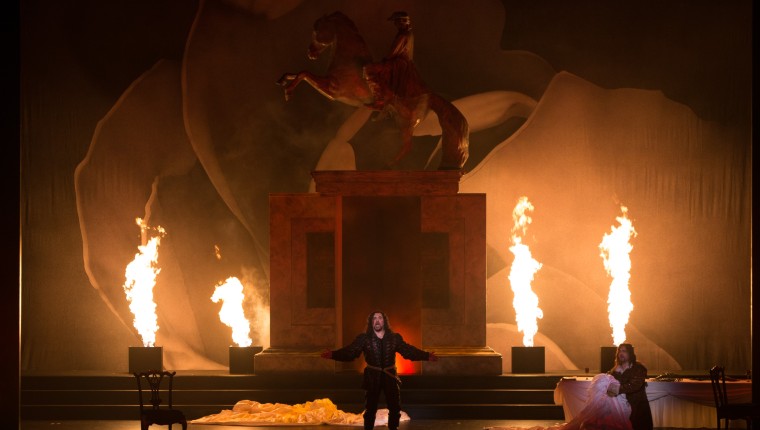Deliciously Ambiguous Dramatic Comedy
February 2 and 4
Straz Center, Tampa
Details here
Is it possible to be a delightful monster? Can someone who murders men and assaults women be anything less than lecherous and despicable?
Mozart apparently thought so in bringing to life Don Giovanni, his jocular drama about the amoral but often amusing adventures of the most adulterous cad in opera.
You can decide for yourself this weekend when Opera Tampa, members of The Florida Orchestra and TFO music director Michael Francis gear up for a newly staged production of Mozart’s treasured classic.
Many argue that Don Giovanni is Mozart’s most convincing stage work, and he made a strong case through his collaboration with librettist Lorenzo da Ponte, whose own unscrupulous nature found camaraderie in the plot.
Essentially a morality play, the opera follows the philandering Don Juan, his sexual conquests (more than 2,000), his recent failed attempts to seduce women – and eventual banishment to perdition. Mozart takes what could have been a stern treatise on hedonism and turns it into a master class in character studies.
With Don Giovanni, he seamlessly blends elements of comedy and drama, even in the D minor/D major contrast first heard in the overture that later erupts – with supernatural ferocity − in the final scene. Here, Mozart moved away from his Classical-era roots toward the passion of Romanticism, his dramatic language intensifying in the lengthy finales of both acts.
But Mozart also tackled Herculean complexities on another level. In the ball scene that ends Act 1, for instance, three small orchestras enter the stage, each playing different music that represents levels of social class – a minuet in 3/4 time, a country dance in 2/4 time, and an allemande in 3/8 time.
While this is going on, the real orchestra in the pit and singers onstage must make this musical jigsaw puzzle work.
Don Juan the libertine might be the star of the show, but the opera is essentially about women and their reactions to male behavior. Without Donna Anna, Donna Elvira and Zerlina, the central character would be of one dimension.
Mozart designed music distinctively for each role, such as the plaintive themes that carry Elvira from turbulence in Act 1 to genuine heartbreak in Act II.
No opera up to this time − 1787 – could match what Mozart gave us at the end, when the graveyard statue of the Commendatore appears at a banquet and condemns Don Juan to the fires of hell.
Cast in the same disturbing key as his Requiem, the final scene is not only compelling, but frightening, and its link to the overture feels like the arching harmonic plan of a symphony.
The composer Charles Gounod called the opera a “work without blemish, of uninterrupted perfection.’’ Novelist Gustav Flaubert described it as among the three finest things God ever created, alongside Hamlet and the sea.
The critic Virgil Thomson called out the opera’s ambiguity by describing it as “one of the funniest shows in the world and one of the most terrifying.
“It’s a moral entertainment so movingly human that the morality gets lost before the play is scarcely started.’’
Opera Tampa performs
Don Giovanni
Friday, February 2 at 8 pm
and
Sunday, February 4 at 2 pm
Straz Center for the Performing Arts
1010 N. MacInnes Place
Tampa FL 33601
Details here





